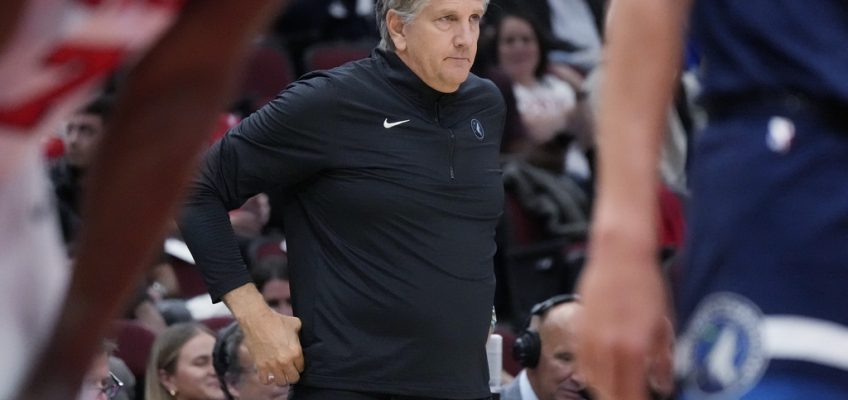There was no mistaking what Minnesota’s primary issue has been through the first 14 games of the season, at least versus potential and expectation — the defensive side of the ball.
The Wolves were 12th in the NBA in defensive rating entering Wednesday’s games, surrendering 111.7 points per 100 possessions. That’s not hideous, but it’s a far cry from the league-best defense Minnesota sported a season prior.
Immediately after the Wolves eeked out a win over Phoenix on Sunday, coach Chris Finch called the team’s defensive fundamentals “leaky” before noting the three days the Wolves had off between that win and Thursday’s bout in Toronto were “well timed.”
“We’ve got to get some things straight,” Finch said. “I think we’ve got to simplify some stuff for our guys right now, and find that kind of defensive consistency that we don’t have right now.”
On Wednesday, Finch confirmed he believes the team’s competitiveness is “there” on that end, but noted there’s too much indecision and hesitation about who is going where on the floor and why.
“The debate around that is what’s holding us down right now,” Finch said.
Finch said Sunday there are a couple of concepts offenses are relying on more and more that Minnesota needed to clarify how it wanted to cover. At least one of those could be off-ball, perimeter wing screens that seem to have Minnesota hung up about who is supposed to be the “low man” protecting the rim at certain points. The Wolves’ help defense gets wonky in those scenarios.
Only one of Minnesota’s three days off featured a full-on practice. Rudy Gobert noted after Sunday’s game Minnesota also needed some time to simply recharge. The gap between games should’ve allowed for that, plus film study and on-court reps to patch up weak spots.
In the past, Finch’s Timberwolves have utilized these work opportunities well. Over the previous three seasons, Minnesota was 11-3 in games fresh off a break of three-plus days. Generally, Finch identifies a problem, potential corrections are explained and drilled, and the situation is seemingly remedied by the next contest. Specifically on the defensive end, the Wolves have held opponents well below 45 percent shooting in those 14 games.
How? Finch may have explained that this week when discussing how his staff approaches film study.
“I think a lot of times you’re wrong (in your postgame takeaways) in the sense that some things feel or look worse, or because they happen, you put an unnecessary amount of negative emotion to it. So you might feel like something happened and it didn’t really happen. But generally, when you lose, you can kind of point to one or two things, or when you win, I’m a big believer that there’s a point in the game — it could be at any point in the game — where you either win or lose it. Those are pretty easy to identify for me. even before we see the tape,” Finch said. “But we also go through the tape, play by play, break it down, and we try to look at the themes that happen in the game. Try not to look at every single mistake, because you don’t accomplish a lot when you do that. I think it’s better if you can just focus on two or three theme.”
If the defense — and a few key parts of it — were specific themes, Thursday should reveal how correctable any shortcomings indeed were. Because this was the time to fix them.
“We’ve got to be better at the basics. We’re not very good right there. Ball contain and rim protection have been not there consistently,” Finch said. “So we’ve gotta get better at that. Rudy has to commit earlier when he’s out there. And when Rudy’s not out there, we have to have a more tight shell. Those types of things gotta be reinforced when you get a chance to practice.”


Leave a Reply